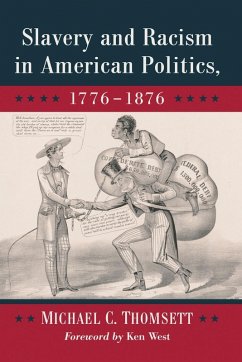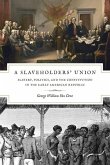Michael C. Thomsett
Slavery and Racism in American Politics, 1776-1876
Michael C. Thomsett
Slavery and Racism in American Politics, 1776-1876
- Broschiertes Buch
- Merkliste
- Auf die Merkliste
- Bewerten Bewerten
- Teilen
- Produkt teilen
- Produkterinnerung
- Produkterinnerung
From early legislation like the Fugitive Slave Law of 1793 to Reconstruction and the rise of the Ku Klux Klan, this book explores the background of some of America's most controversial moments. Spanning the first American century, it offers a detailed chronology of slavery and racism in early US politics and society.
Andere Kunden interessierten sich auch für
![History Of American Medical Literature From 1776 To The Present Time (1876) History Of American Medical Literature From 1776 To The Present Time (1876)]() Samuel David GrossHistory Of American Medical Literature From 1776 To The Present Time (1876)30,99 €
Samuel David GrossHistory Of American Medical Literature From 1776 To The Present Time (1876)30,99 €![Abolition: Politics, Practices, Promises, Vol. 1 Abolition: Politics, Practices, Promises, Vol. 1]() Angela Y. DavisAbolition: Politics, Practices, Promises, Vol. 114,99 €
Angela Y. DavisAbolition: Politics, Practices, Promises, Vol. 114,99 €![A Slaveholders` Union - Slavery, Politics, and the Constitution in the Early American Republic A Slaveholders` Union - Slavery, Politics, and the Constitution in the Early American Republic]() George William Van CleveA Slaveholders` Union - Slavery, Politics, and the Constitution in the Early American Republic40,99 €
George William Van CleveA Slaveholders` Union - Slavery, Politics, and the Constitution in the Early American Republic40,99 €![The Federalist Papers The Federalist Papers]() Alexander HamiltonThe Federalist Papers7,49 €
Alexander HamiltonThe Federalist Papers7,49 €![The Patriots' Dilemma The Patriots' Dilemma]() Timothy Messer-KruseThe Patriots' Dilemma18,99 €
Timothy Messer-KruseThe Patriots' Dilemma18,99 €![The Great New York Fire of 1776 The Great New York Fire of 1776]() Benjamin L. CarpThe Great New York Fire of 177622,99 €
Benjamin L. CarpThe Great New York Fire of 177622,99 €![Signing Their Lives Away Signing Their Lives Away]() Denise KiernanSigning Their Lives Away21,99 €
Denise KiernanSigning Their Lives Away21,99 €-
-
-
From early legislation like the Fugitive Slave Law of 1793 to Reconstruction and the rise of the Ku Klux Klan, this book explores the background of some of America's most controversial moments. Spanning the first American century, it offers a detailed chronology of slavery and racism in early US politics and society.
Hinweis: Dieser Artikel kann nur an eine deutsche Lieferadresse ausgeliefert werden.
Hinweis: Dieser Artikel kann nur an eine deutsche Lieferadresse ausgeliefert werden.
Produktdetails
- Produktdetails
- Verlag: McFarland & Co Inc
- Seitenzahl: 249
- Erscheinungstermin: 16. Dezember 2019
- Englisch
- Abmessung: 229mm x 152mm x 13mm
- Gewicht: 336g
- ISBN-13: 9781476670997
- ISBN-10: 1476670994
- Artikelnr.: 55309885
- Herstellerkennzeichnung
- Libri GmbH
- Europaallee 1
- 36244 Bad Hersfeld
- gpsr@libri.de
- Verlag: McFarland & Co Inc
- Seitenzahl: 249
- Erscheinungstermin: 16. Dezember 2019
- Englisch
- Abmessung: 229mm x 152mm x 13mm
- Gewicht: 336g
- ISBN-13: 9781476670997
- ISBN-10: 1476670994
- Artikelnr.: 55309885
- Herstellerkennzeichnung
- Libri GmbH
- Europaallee 1
- 36244 Bad Hersfeld
- gpsr@libri.de
Michael C. Thomsett is the author, coauthor or compiler of many books including topical dictionaries, collections of quotations and history books. He lives in Spring Hill, Tennessee.
Table of Contents Foreword by Ken West Preface Part I: Slavery, Political Parties and the Supreme Court 1.
A Pill Too Bitter to Swallow The Presentation of a Complex History
7
Racism in Context
9
Jim Crow
11 2.
The Most Oppressive Dominion Slavery in the New World
17
The Three-Fifths Compromise
19
The Slave Power
22
The Northwest Ordinance of 1787
26
The Fugitive Slave Law of 1793
27
The Slave Trade Act of 1794
28
Act Prohibiting Importation of Slaves of 1807
29
The Missouri Compromise
29
The Wilmot Provisö31
The Compromise of 1850
36
Fugitive Slave Act of 1850
37
Kansas-Nebraska Act of 1854
38
The Ostend Manifestö42 3.
The Greatest Political Evil The First Party System
45
The Federalist Party
47
The Emergence of the Whig Party
49
The Free Soil Party
51
Founders' Concerns About a Party System
53
The Era of Good Feelings
54
Democracy and Andrew Jackson
55
The Second Party System
56
A Change in Political Climate
58
Republicans from 1854 to 1860
59
The Know Nothing Movement
62
The Opposition Party and the Constitutional Union Party
64
The Election of 1860
65 4.
"A Slave, and Not a Citizen" Slavery-Related Cases and the Supreme Court
71
The Nullification Battle
72
McCullough v. Maryland
73
Gibbons v. Ogden
74
The Antelope
75
Roger B. Taney
76
New York v. Miln
78
The Amistad
79
"Unless prohibited by state legislation"
82
Strader v. Graham
84
Dred Scott v. Sandford
85
Ableman v. Booth
92
Unintended Consequences
93
Slavery and Racism in Context
94 Part II: Politics During the Civil War Years 5.
Let Us Cross Over the River The Secession Movement in South Carolinä100
The Crittenden Compromise
101
The Struggle Toward Secession
103
Virginia's Debate
105
Lincoln's Policies in 1861
107
The Rise of the Copperheads
112
Controversy About Secession and Slavery
116
Suspension of Habeas Corpus
118
Copperhead Editorials on Slavery
120 6.
The Age of the Copperheads, 1862-1863 The Evolution of a Struggle: 1862
123
Copperhead Racism in the North
125
Lincoln's Decision: The Emancipation Proclamation
127
Copperhead Reaction
131
The Copperhead Response
135
The Intellectual Arm of the Copperheads
136
Pro-Lincoln Responses
138
The Enrollment Act
139
Growing Copperhead Strength
143
A Change in Sentiment
145 7.
Copperhead Resistance, 1864-1865 Possible Replacement Candidates for Lincoln
148
Southern Economic Problems in 1864
151
The Party Platforms
154
Conspiracy in 1864 by Copperhead Groups
158
Confederate Efforts at Negotiating Peace
162
The Political Climate in 1864
163
Political Responses to Lincoln's Victory
165
Post-Election Conditions and the Thirteenth Amendment
166 Part III: Politics During Reconstruction 8.
Parties in Conflict-The Johnson Administration Andrew Johnson and the Post-War Erä173
The New Administration and the South
174
The Freedmen's Bureau Bill
175
Black Codes in 1865 and 1866
178
The Civil Rights Act of 1866
180
Johnson's Loyalty to the Democrats
182
Concerns Among Democrats
185
The Election of 1868
187 9.
Presidents Grant and Hayes and the Ku Klux Klan President Grant's Election
192
Origins of Secret Societies in the U.S.
195
The Klan's Purpose Evolves
198
The Klan As an Underground Terrorist Organization
200
Grant's Second Administration
203 Chapter Notes Bibliography Index
A Pill Too Bitter to Swallow The Presentation of a Complex History
7
Racism in Context
9
Jim Crow
11 2.
The Most Oppressive Dominion Slavery in the New World
17
The Three-Fifths Compromise
19
The Slave Power
22
The Northwest Ordinance of 1787
26
The Fugitive Slave Law of 1793
27
The Slave Trade Act of 1794
28
Act Prohibiting Importation of Slaves of 1807
29
The Missouri Compromise
29
The Wilmot Provisö31
The Compromise of 1850
36
Fugitive Slave Act of 1850
37
Kansas-Nebraska Act of 1854
38
The Ostend Manifestö42 3.
The Greatest Political Evil The First Party System
45
The Federalist Party
47
The Emergence of the Whig Party
49
The Free Soil Party
51
Founders' Concerns About a Party System
53
The Era of Good Feelings
54
Democracy and Andrew Jackson
55
The Second Party System
56
A Change in Political Climate
58
Republicans from 1854 to 1860
59
The Know Nothing Movement
62
The Opposition Party and the Constitutional Union Party
64
The Election of 1860
65 4.
"A Slave, and Not a Citizen" Slavery-Related Cases and the Supreme Court
71
The Nullification Battle
72
McCullough v. Maryland
73
Gibbons v. Ogden
74
The Antelope
75
Roger B. Taney
76
New York v. Miln
78
The Amistad
79
"Unless prohibited by state legislation"
82
Strader v. Graham
84
Dred Scott v. Sandford
85
Ableman v. Booth
92
Unintended Consequences
93
Slavery and Racism in Context
94 Part II: Politics During the Civil War Years 5.
Let Us Cross Over the River The Secession Movement in South Carolinä100
The Crittenden Compromise
101
The Struggle Toward Secession
103
Virginia's Debate
105
Lincoln's Policies in 1861
107
The Rise of the Copperheads
112
Controversy About Secession and Slavery
116
Suspension of Habeas Corpus
118
Copperhead Editorials on Slavery
120 6.
The Age of the Copperheads, 1862-1863 The Evolution of a Struggle: 1862
123
Copperhead Racism in the North
125
Lincoln's Decision: The Emancipation Proclamation
127
Copperhead Reaction
131
The Copperhead Response
135
The Intellectual Arm of the Copperheads
136
Pro-Lincoln Responses
138
The Enrollment Act
139
Growing Copperhead Strength
143
A Change in Sentiment
145 7.
Copperhead Resistance, 1864-1865 Possible Replacement Candidates for Lincoln
148
Southern Economic Problems in 1864
151
The Party Platforms
154
Conspiracy in 1864 by Copperhead Groups
158
Confederate Efforts at Negotiating Peace
162
The Political Climate in 1864
163
Political Responses to Lincoln's Victory
165
Post-Election Conditions and the Thirteenth Amendment
166 Part III: Politics During Reconstruction 8.
Parties in Conflict-The Johnson Administration Andrew Johnson and the Post-War Erä173
The New Administration and the South
174
The Freedmen's Bureau Bill
175
Black Codes in 1865 and 1866
178
The Civil Rights Act of 1866
180
Johnson's Loyalty to the Democrats
182
Concerns Among Democrats
185
The Election of 1868
187 9.
Presidents Grant and Hayes and the Ku Klux Klan President Grant's Election
192
Origins of Secret Societies in the U.S.
195
The Klan's Purpose Evolves
198
The Klan As an Underground Terrorist Organization
200
Grant's Second Administration
203 Chapter Notes Bibliography Index
Table of Contents Foreword by Ken West Preface Part I: Slavery, Political Parties and the Supreme Court 1.
A Pill Too Bitter to Swallow The Presentation of a Complex History
7
Racism in Context
9
Jim Crow
11 2.
The Most Oppressive Dominion Slavery in the New World
17
The Three-Fifths Compromise
19
The Slave Power
22
The Northwest Ordinance of 1787
26
The Fugitive Slave Law of 1793
27
The Slave Trade Act of 1794
28
Act Prohibiting Importation of Slaves of 1807
29
The Missouri Compromise
29
The Wilmot Provisö31
The Compromise of 1850
36
Fugitive Slave Act of 1850
37
Kansas-Nebraska Act of 1854
38
The Ostend Manifestö42 3.
The Greatest Political Evil The First Party System
45
The Federalist Party
47
The Emergence of the Whig Party
49
The Free Soil Party
51
Founders' Concerns About a Party System
53
The Era of Good Feelings
54
Democracy and Andrew Jackson
55
The Second Party System
56
A Change in Political Climate
58
Republicans from 1854 to 1860
59
The Know Nothing Movement
62
The Opposition Party and the Constitutional Union Party
64
The Election of 1860
65 4.
"A Slave, and Not a Citizen" Slavery-Related Cases and the Supreme Court
71
The Nullification Battle
72
McCullough v. Maryland
73
Gibbons v. Ogden
74
The Antelope
75
Roger B. Taney
76
New York v. Miln
78
The Amistad
79
"Unless prohibited by state legislation"
82
Strader v. Graham
84
Dred Scott v. Sandford
85
Ableman v. Booth
92
Unintended Consequences
93
Slavery and Racism in Context
94 Part II: Politics During the Civil War Years 5.
Let Us Cross Over the River The Secession Movement in South Carolinä100
The Crittenden Compromise
101
The Struggle Toward Secession
103
Virginia's Debate
105
Lincoln's Policies in 1861
107
The Rise of the Copperheads
112
Controversy About Secession and Slavery
116
Suspension of Habeas Corpus
118
Copperhead Editorials on Slavery
120 6.
The Age of the Copperheads, 1862-1863 The Evolution of a Struggle: 1862
123
Copperhead Racism in the North
125
Lincoln's Decision: The Emancipation Proclamation
127
Copperhead Reaction
131
The Copperhead Response
135
The Intellectual Arm of the Copperheads
136
Pro-Lincoln Responses
138
The Enrollment Act
139
Growing Copperhead Strength
143
A Change in Sentiment
145 7.
Copperhead Resistance, 1864-1865 Possible Replacement Candidates for Lincoln
148
Southern Economic Problems in 1864
151
The Party Platforms
154
Conspiracy in 1864 by Copperhead Groups
158
Confederate Efforts at Negotiating Peace
162
The Political Climate in 1864
163
Political Responses to Lincoln's Victory
165
Post-Election Conditions and the Thirteenth Amendment
166 Part III: Politics During Reconstruction 8.
Parties in Conflict-The Johnson Administration Andrew Johnson and the Post-War Erä173
The New Administration and the South
174
The Freedmen's Bureau Bill
175
Black Codes in 1865 and 1866
178
The Civil Rights Act of 1866
180
Johnson's Loyalty to the Democrats
182
Concerns Among Democrats
185
The Election of 1868
187 9.
Presidents Grant and Hayes and the Ku Klux Klan President Grant's Election
192
Origins of Secret Societies in the U.S.
195
The Klan's Purpose Evolves
198
The Klan As an Underground Terrorist Organization
200
Grant's Second Administration
203 Chapter Notes Bibliography Index
A Pill Too Bitter to Swallow The Presentation of a Complex History
7
Racism in Context
9
Jim Crow
11 2.
The Most Oppressive Dominion Slavery in the New World
17
The Three-Fifths Compromise
19
The Slave Power
22
The Northwest Ordinance of 1787
26
The Fugitive Slave Law of 1793
27
The Slave Trade Act of 1794
28
Act Prohibiting Importation of Slaves of 1807
29
The Missouri Compromise
29
The Wilmot Provisö31
The Compromise of 1850
36
Fugitive Slave Act of 1850
37
Kansas-Nebraska Act of 1854
38
The Ostend Manifestö42 3.
The Greatest Political Evil The First Party System
45
The Federalist Party
47
The Emergence of the Whig Party
49
The Free Soil Party
51
Founders' Concerns About a Party System
53
The Era of Good Feelings
54
Democracy and Andrew Jackson
55
The Second Party System
56
A Change in Political Climate
58
Republicans from 1854 to 1860
59
The Know Nothing Movement
62
The Opposition Party and the Constitutional Union Party
64
The Election of 1860
65 4.
"A Slave, and Not a Citizen" Slavery-Related Cases and the Supreme Court
71
The Nullification Battle
72
McCullough v. Maryland
73
Gibbons v. Ogden
74
The Antelope
75
Roger B. Taney
76
New York v. Miln
78
The Amistad
79
"Unless prohibited by state legislation"
82
Strader v. Graham
84
Dred Scott v. Sandford
85
Ableman v. Booth
92
Unintended Consequences
93
Slavery and Racism in Context
94 Part II: Politics During the Civil War Years 5.
Let Us Cross Over the River The Secession Movement in South Carolinä100
The Crittenden Compromise
101
The Struggle Toward Secession
103
Virginia's Debate
105
Lincoln's Policies in 1861
107
The Rise of the Copperheads
112
Controversy About Secession and Slavery
116
Suspension of Habeas Corpus
118
Copperhead Editorials on Slavery
120 6.
The Age of the Copperheads, 1862-1863 The Evolution of a Struggle: 1862
123
Copperhead Racism in the North
125
Lincoln's Decision: The Emancipation Proclamation
127
Copperhead Reaction
131
The Copperhead Response
135
The Intellectual Arm of the Copperheads
136
Pro-Lincoln Responses
138
The Enrollment Act
139
Growing Copperhead Strength
143
A Change in Sentiment
145 7.
Copperhead Resistance, 1864-1865 Possible Replacement Candidates for Lincoln
148
Southern Economic Problems in 1864
151
The Party Platforms
154
Conspiracy in 1864 by Copperhead Groups
158
Confederate Efforts at Negotiating Peace
162
The Political Climate in 1864
163
Political Responses to Lincoln's Victory
165
Post-Election Conditions and the Thirteenth Amendment
166 Part III: Politics During Reconstruction 8.
Parties in Conflict-The Johnson Administration Andrew Johnson and the Post-War Erä173
The New Administration and the South
174
The Freedmen's Bureau Bill
175
Black Codes in 1865 and 1866
178
The Civil Rights Act of 1866
180
Johnson's Loyalty to the Democrats
182
Concerns Among Democrats
185
The Election of 1868
187 9.
Presidents Grant and Hayes and the Ku Klux Klan President Grant's Election
192
Origins of Secret Societies in the U.S.
195
The Klan's Purpose Evolves
198
The Klan As an Underground Terrorist Organization
200
Grant's Second Administration
203 Chapter Notes Bibliography Index








